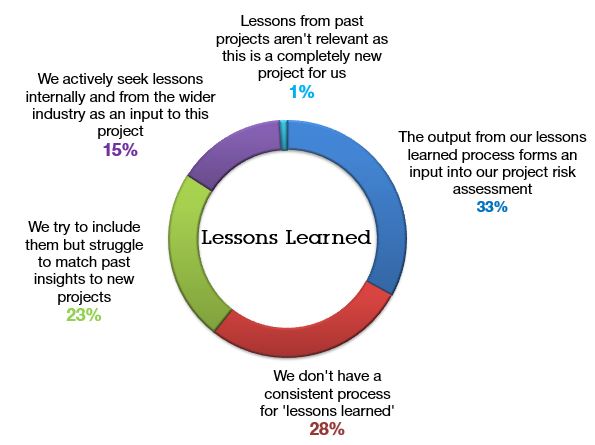
Are your teams learning to see patterns?
We have talked before how organizations try to extract lessons from past projects to apply to their next ones. While most companies espouse the concept enthusiastically, the individuals who find themselves embroiled in the process are usually less keen.
Trying to do something, then responding to feedback, is how we learn to walk, talk, or use a fork. Such individual learning is innate. But then we go to school, entering a system which prizes ‘the right answer’, rather than learning from the wrong one. This ultimately affects how people react in organizations.
When projects are worth hundreds of millions or more, the perceived price of failure encourages people to hide behind process. And when something inevitably goes wrong, a blame game may prevent learning from happening.
Our observation in the field has been that most organizations are good at capturing all manner of ‘lessons’. But not so good at appraising them and transferring their hard-won knowledge for the benefit of the next project.
Past project lessons are valuable because they are captured after the fact when the associated impacts are known. Such learning should therefore become a ‘known risk’. You can never get around uncertainty, but you can increase the known risks you anticipate.
Even better if you can abstract a lesson one step further. So not simply: ‘When preparing for X, consider that Y might happen.’ But: ‘What other activities are like X? And might any part of those processes lead to a Y situation?’
This pattern-matching approach widens the available inputs the next project team has to draw on.
We analysed some of the data received from active project professionals working on large complex, energy industry projects, using our software, Project Horizons . To find out what, they think about lessons learned:

We weren’t surprised that 23% felt that their organizations struggled with this appraisal and transfer aspect of the process. But were a little taken aback by the honesty of the 28% who thought their organization didn’t have much of a process at all.
(We are curious about the 1% who don’t view past learning as relevant. Perhaps they are involved in a uniquely cutting-edge technology project that renders all that’s gone before irrelevant. Somehow, we doubt it. Perhaps they’re missing a trick.)
Fortunately, the majority appear to have some process in place. And a third claim that the ‘output from their lessons learned process forms an input to their next project risk assessment’. Based on our experience, though, we wonder how many are paying lip service to the idea.
How does learning from project to project happen in your organization?


